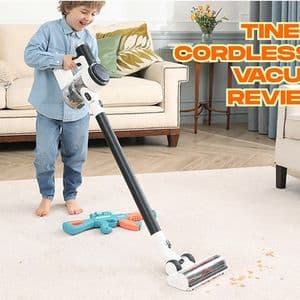Key Considerations for Vinyl Floors
1. Soft-Touch Wheels
Vinyl flooring can be scratched by abrasive or hard plastic wheels. Look for robot vacuums with rubberized or soft-coated wheels to prevent surface damage.
2. Brushless or Soft Brush Design
Traditional bristle brushes may scuff or leave marks on vinyl. Some models offer silicone rollers or brushless designs to glide safely across delicate surfaces.
3. Strong Suction, Gentle Touch
Suction power matters, but aggressive spinning or dragging can do more harm than good. A balanced design with adjustable suction is ideal.
4. Smart Navigation
Good mapping prevents the robot from repeatedly bumping into edges or dragging debris. Advanced models learn room layouts and clean efficiently.
5. Lightweight and Low-Profile
A heavy robot might leave indentations, especially on older or cushioned vinyl. Lightweight and compact designs are safer and more effective in tight spaces.
Features That Make a Difference
Smart Mapping & Zone Cleaning
Modern robot vacuums come equipped with sensors and apps that allow for custom cleaning zones. For instance, you can set no-go zones around pet bowls or damp areas.
Looking for something high-tech? The bush robot sweeper concept—though still largely conceptual—represents where automation is heading, with intelligent cleaning and surface-aware adaptability.
Battery Life & Runtime
The larger the space, the longer the battery you’ll need. Aim for models that last at least 90 minutes on a full charge.
Mop Combo Functionality
Some robot vacuums come with mopping features, which can be useful for vinyl—as long as they use just enough water. Avoid units that release too much moisture, as it can seep between planks or tiles.
Maintenance Tips for Vinyl Floor Robots
Now that you've got your vacuum, here's how to make it last and protect your floors.
Clean the Brushes Regularly
Even rubber brushes can trap pet hair and dirt. Regular cleaning prevents the vacuum from dragging debris across the vinyl, which could cause micro-scratches.
Empty the Bin Frequently
A full bin reduces suction and efficiency. Most models alert you, but a good habit is to empty after every major cleaning.
Check the Wheels for Debris
Sand or small stones can get caught in the wheels and scratch the floor. Wipe them down weekly if your robot runs daily.
Read more: roomba wood floor cleaner
Are Roombas Safe for Vinyl Floors?
Absolutely—if you choose the right model. The Roomba lineup includes several options that are vinyl-safe, especially those with rubberized rollers and smart navigation. A great example is the roomba vacuum hardwood floors category, which includes models designed to be tough on dirt but gentle on surfaces.
Just be sure to avoid older models with aggressive bristle brushes or outdated navigation tech.
Final Thoughts
So—what is the best robot vacuum for vinyl floors? It depends on your specific needs. If you have a pet-heavy household, go for strong suction and smart mapping. If you value quiet operation and simplicity, Eufy is a solid choice. Need mop functionality? Roborock and Shark deliver excellent hybrid designs.
Vinyl is forgiving, but it does best with a vacuum designed for care. Choose wisely, and your floors will thank you.



















